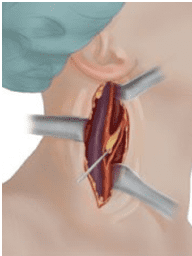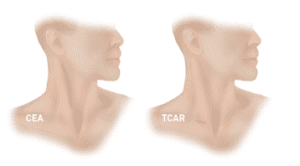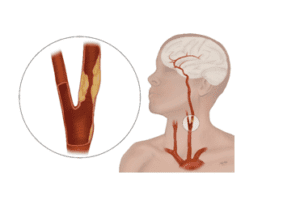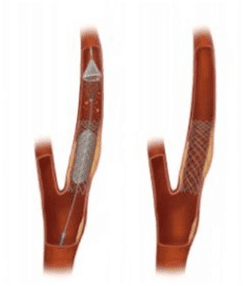Carotid Artery Disease Specialist

Acadiana Vascular Clinic:
Vein Center of Louisiana
Lafayette, LA

Acadiana Vascular Clinic:
Vein Center of Louisiana
Lafayette, LA
Carotid Artery Disease Q & A
What is carotid artery disease?
Carotid artery disease is a condition that affects the carotid arteries, which run along each side of your neck. These arteries supply oxygen-rich blood from your heart to your brain. With CAD, these arteries become clogged, and the blood flow to your brain is diminished or blocked.
Blockage is due to a buildup of plaque, which is made up of cholesterol, calcium, and fibrous tissue. Over time, plaque collects and the arteries narrow and stiffen in the area of the buildup. Carotid artery disease places you at elevated risk for stroke, as well as heart failure.
Who is at risk for carotid artery disease?
You’re at higher risk for carotid artery disease if you:
- Are obese
- Have an unhealthy diet
- Have high blood pressure
- Smoke
- Are male
- Have high cholesterol
If you have these risk factors, it’s important that you’re screened regularly for evidence of carotid artery disease.
What are symptoms of carotid artery disease?
Carotid artery disease can be dangerous because it may not present symptoms in its early stages. Many don’t know they have carotid artery disease until they have a stroke or transient ischemic attack (TIA).
Symptoms of TIA are similar to those of a stroke and usually resolve within 24 hours. These include:
- Weakness, numbness, or tingling on one side
- Inability to move or control movement on one side
- Sudden vision loss in one eye
- Inability to speak clearly
If you have any of these symptoms, it’s important to seek medical treatment immediately.
What treatments are available for carotid artery disease?
The Vein Center of Louisiana provides a number of treatment options for carotid artery disease, including:
- Endarterectomy: surgical removal of plaque from inside an artery
- Angioplasty: a balloon inside the artery to unblock blood flow
- Stent: a mesh tube that holds plaque back and prevents blockage
The providers at the Vein Center of Louisiana are certified and have been recognized for excellence in the use of transcarotid artery revascularization (TCAR). This revolutionary method helps to decrease the risk of stroke associated with stent placement and other treatments by filtering potential clot-forming material out of the blood during the procedure.
To be screened or treated for carotid artery disease, call or book an appointment with the Vein Center of Louisiana.
What is a Carotid Endarterectomy?
Carotid endarterectomy is a surgical procedure to remove plague in the carotid artery in the neck. The procedure is performed to prevent worsening blockages of the carotid artery that can lead to increased risks of having a stroke.
What is a TCAR?
TCAR, Transcarotid Artery Revascularization, is a minimally invasive procedure performed by surgeons to deliver a stent to the blockage in the carotid artery to help prevent stroke. A surgeon makes a small incision over at the base of the neck to get to the carotid artery to deploy a stent across the blockage in the carotid artery.
How does carotid intervention prevent me from having a stroke?
Yes, carotid endarterectomy or TCAR, can reduce the risks of stroke in selective individuals. Blockages in the carotid artery are responsible for 10-20% of all strokes that happen in the population.
Does carotid stenosis always require surgery?
No, surgery is not require for mild stenosis or blockage because the risks of stroke with mild stenosis is lower. Mild stenosis in the carotid artery is controlled with medications including aspirin and cholesterol reducing medications. Critical or high-grade stenosis would require intervention to reduce stroke with either carotid endarterectomy or TCAR.
What is carotid artery stenosis?
Carotid artery stenosis is the narrowing or blockage of the blood vessels in the neck that bring blood from the heart to the brain. The stenosis is caused by cholesterol build-up leading to the narrowing of the lumen of the blood vessels. Carotid artery stenosis can lead to stroke.
What are signs/symptoms of a stroke?
Signs of stroke can last for 30 seconds or longer.
If a patient experiences blindness to one eye, like a curtain going down, briefly for 30 seconds or a minute. This is a sign of a transient stroke and can happen again.
Symptoms that are more pronounced and noticeable are weakness in the hand or leg; paralysis of one side of the body. Difficulty speaking or slurring of speech. Difficulty with comprehending what other people are saying. Difficulty walking or dizziness.
What happens if I do not have surgery for carotid artery stenosis?
If you have high grade stenosis or blockage of the carotid artery, without intervention, you are putting yourself at risk for stroke.
What are the restrictions after carotid surgery?
There are minimal restrictions after carotid surgery. Patients usually stay overnight at the hospital for monitoring. At home, you can resume normal activities as you can tolerate. No driving for 1 week or when taking pain medication.




